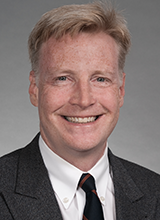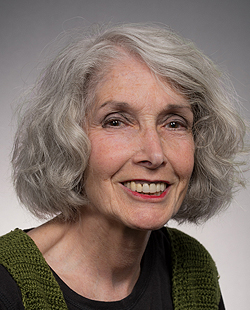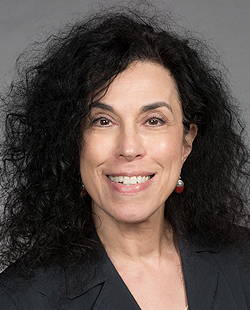Personal Statement
I am the Psychiatry Chief of Service for both campuses of the University of Washington Medical Center. I also direct our Psychiatric Consultation and Telepsychiatry Program. My clinical focus is on patients who are hospitalized with simultaneous psychiatric and medical issues. Academically, I most often teach psychiatry trainees about psychopharmacology for refractory mood, anxiety, and psychotic disorders.
Personal Statement
Dr. Jakupcak studies and treats posttraumatic stress disorder (PTSD) and associated high risk behaviors such as substance abuse and violence. He is also interested in novel treatment approaches to PTSD, including Behavioral Activation (BA) and primary care based treatment models. Dr. Jakupcak is currently funded to study BA and cognitive skills training for returning Veterans with PTSD and mild traumatic brain injury (mTBI).

Personal Statement
I am a clinical psychologist with research interests in the treatment of alcohol and substance use disorders and co-occurring mental health conditions.
My research focuses on understanding how to improve access to evidence-based treatments and understanding why and how patients benefit from treatment. I am particularly interested in research measurement-based care — i.e., the use of standardized measures to monitor treatment progress and inform clinical decision-making.
Broad areas of interest include:
- Alcohol and drug use disorder treatment, including the effectiveness of digital and behavioral interventions, mechanisms of behavioral change, and social and environmental determinants of change.
- Technology to support behavioral change, including patient- and clinician-facing tools that support clinical decision-making, treatment adherence, and treatment progress monitoring.
- Applied statistical analysis, including methods for analyzing longitudinal data, clinical trials data, multilevel data, missing data, psychometric analysis, and data visualization.

Personal Statement
Dr. Gudmundsen works at Seattle Children’s with a focus on adolescents with mood disorders. She is based in the Mood and Anxiety Program and mostly works with adolescents with depression and suicidality, in addition to anxiety and bipolar spectrum disorders. This work almost always involves parents and families, in addition to other key players such as teachers or medical providers. She typically administers BA, CAMS, or CBT, but also does some IPSRT with youth with mania. In addition to serving as the Child Track Training Coordinator for the UW Psychology Internship, she is also an outpatient supervisor for Psychology Residents and Postdoctoral Fellows. She also provides consultation to the Child Psychiatry Fellows, Medical Students and to School-Based Mental Health Therapists in the Seattle Public Schools. She is involved with program development for trainees, as well as the Mood and Anxiety Specialty Program. Her research focuses on developing and tailoring interventions for adolescent depression, including the Adolescent Behavioral Activation Program (A-BAP).

Personal Statement
Having always been interested in wholistic care, I completed a Med-Psych residency with board certification in both Internal Medicine and Psychiatry. My career has focused on integrating care to improve access to those who suffer from mental disorders. I have experience in developing, implementing, leading, and evaluating integrated Primary Care Mental Health programs. This work led to the development and national implementation of integrated care known in the VA as Primary Care Mental Health Integration (PCMHI).
At VA Puget Sound, I led a team that implemented and developed the first PCMHI program which has been rated as one of the top 10. It was through this integrated PCMHI work that I realized rural populations lacked access to mental health care and I became interested in how the emerging digital technologies could be leveraged to provide care. With the goal to improve mental health care for this population, I developed, implemented, and led the first Telemental Health Service at VA Puget Sound known as Promoting Access to Telemental Health (PATH). This program focused on implementing digital health into routine mental health care, evaluation of implementation efforts, and digital health curriculum design. PATH has been fully implemented into VA Puget Sound Mental Health Service Line.
As a researcher, I have served as a principal and co-investigator on numerous research projects that focused on the development and implementation PCMHI and Care Manager programs. More recently, my research has focused on evaluation and implementation of telemental health programs. Current work focuses on improving virtual integrated care in rural VA clinics, integrated care curricular design, evaluating mental health service delivery for the national VA Telehealth Clinical Resource Hubs, and supporting the UW Behavioral Health Institute to develop Digital Health Training programs. In addition, I am proud to serve as a Captain in the United States Navy Reserve and I am an Operation Iraqi Freedom Veteran.

Personal Statement
I am a board certified psychiatrist and work at Fred Hutchinson Cancer Center. I am a Clinical Assistant Professor of Psychiatry and Behavioral Sciences at the University of Washington. I obtained a fellowship in consultation-liaison psychiatry, a specialty that focuses on providing psychiatric care for people with complex medical conditions. My primary clinical focus is people with cancer.
I love my work. Being ill is a vulnerable time and my goal is to ease suffering and provide a sense of connection and understanding for all I work with. I believe in working collaboratively with patients and families. We work together to identify what the goals of treatment are. I have expertise in diagnosis, psychopharmacology and psychotherapy and adapt my recommendations to best serve the goals of the person before me.
I am also passionate about education. I am the site director at Fred Hutch Cancer Center for our Psycho-oncology Fellowship Program. I supervise Cl fellows, addiction fellows, psychiatry residents and provide education to social workers and psychology trainees.
Personal Statement
I work in the Psychiatric Intensive Care Unit where we care for the most psychiatrically and medically compromised patients in the region.
Personal Statement
My professional interests are in the area of behavioral medicine and health psychology, with particular interests in psychological aspects of chronic pain and illness. I also have a strong interest in psychology training and served as Training Director of the Psychology Internship Program at the UW Dept of Psychiatry and Behavioral Sciences from 2003-2013. I have also served as Secretary and member of the Executive Board of the American Pain Society.
Personal Statement
I am a consultation-liaison psychiatrist and health services researcher in the Department of Psychiatry and Behavioral Sciences and Adjunct Professor in the Departments of Rehabilitation Medicine and Epidemiology. I am also Medical Director of the Department of Psychosocial Oncology at Fred Hutchinson Cancer Center.
My research interests are in psychiatric epidemiology, health services research, psychiatric oncology, and neuropsychiatry. In my clinical practice, I use a comprehensive, multifaceted approach that may include medications or counseling to help patients achieve their goals. My primary interest is helping people who are coping with medical illness. I am particularly interested in developing better approaches to delivering person-centered psychiatric care to these populations.
Personal Statement
I completed my undergraduate, medical school, and residency training at the University of Washington in Seattle. I am board certified in family medicine and psychiatry with subspecialty training in addiction medicine. My clinical interests include inpatient and outpatient psychiatric consultation to primary care providers, mood disorders in pregnant and postpartum mothers, and clinical service in underserved communities.









